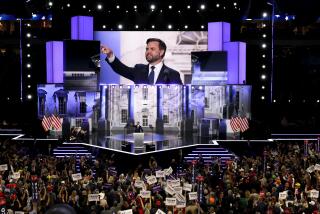The Political Snub Can Rub Both Ways
American politics was a rough business from the start.
But it’s surprisingly rare to see political snubs of the sort State Senate President John Burton delivered to a fellow Democrat this week, when he skipped all but five minutes of Gov. Gray Davis’ State of the State address, offering the excuse that he had been delayed by “traffic and fog.”
Such slights are unusual in this country because the business of politics is very much a business, and it depends on relationships. With our divided government and weak party discipline, political success rests on the ability to wheel and deal across partisan lines.
And the dissed seldom deal.
By contrast, parliamentary democracies have rich histories of delicious insults and slights, the fruits of their regular confrontational debates and rigidly enforced party discipline.
Winston Churchill, for example, famously referred to Clement Attlee, leader of the Labor Party, as “a sheep in sheep’s clothing” and dismissed a persistent parliamentary antagonist as “a squalid nuisance.”
Two hundred years before Churchill, during the debate on the failure of the South Seas Co.--the Enron of its day--an acerbic MP summed up his view of the Earl of Oxford, the firm’s head: “He melded cunning with mediocrity.”
Britain was on the receiving end of one of the 20th century’s most memorable political put-downs. It occurred in 1921, when the insurgent and statesman Michael Collins accepted the British handover of Dublin Castle on behalf of the provisional government of the newly established Irish Free State. At the appointed hour, the entire imperial establishment--civil and military--was drawn up in formation on the castle’s parade ground.
Collins deliberately kept all of them waiting.
When he finally arrived and dismounted from his touring car, Lord FitzAlan, the British viceroy, hissed, “You’re seven minutes late, Mr. Collins.”
“We’ve been waiting 700 years,” Collins snapped back. “You can have the seven minutes.”
Such moments and phrases are rarer in American political history, which is, in fact, replete with examples of snubs and slights that backfired on their perpetrators. In 1916, for example, the GOP’s presidential candidate, Charles Evans Hughes, made a campaign stop in L.A. but declined to make a courtesy phone call to the state’s Republican governor, Hiram Johnson, because he disapproved of the Californian’s enthusiasm for progressive reforms.
The next day, Johnson announced that he was supporting the Democrat, Woodrow Wilson, who carried California and won the presidential election.
Former Los Angeles Mayor Sam Yorty built a reputation for boorishness and bigotry with his racially tinged slights of the man who defeated him, Tom Bradley. Throughout their two electoral contests, Yorty refused to refer to his African American opponent by the honorific titles that reflected his service as a City Council member and an LAPD command officer. Yorty, in fact, refused even to use the word “Mister,” habitually calling the challenger simply “Bradley.”
Similarly graceless in defeat, Yorty left for an Alaskan cruise rather than attend Bradley’s inauguration as tradition dictated. The two men never spoke again. Actually, there were those who felt Bradley had fared better than many of Yorty’s opponents, whom he usually attacked as communists.
During a luncheon at The Times some years later, former Gov. Edmund G. (Pat) Brown recalled Yorty’s history as a red-baiter and described him as “the cleverest concocter of phony issues I ever knew.”
Coming from a man who ran against Richard Nixon, that means something.
Sometimes a political snub can cut both ways.
In October 1995, for example, then-Speaker of the House Newt Gingrich (R-Ga.) was relegated to a back seat on Air Force One when he accompanied President Clinton to the funeral of the assassinated Israeli prime minister, Yitzhak Rabin. Gingrich’s loud public complaints about the slight led many to characterize him as a crybaby, thereby undermining his status. Memories of the incident, however, helped fuel conservative Republican animosity toward Clinton, which helped pave the way for--oh, never mind.
More recently, on Feb. 21, then-GOP presidential hopeful Sen. John McCain of Arizona told a campaign rally in Virginia Beach, Va., that conservative Christian ministers Pat Robertson and Jerry Falwell were “agents of intolerance, comparable to Louis Farrakhan and Al Sharpton on the left.” Those remarks helped solidify McCain’s national reputation for candor and independence--and are thought by many political analysts to have cost him the South Carolina primary.
But the right snub by the right politician at the right time can have an unambiguously devastating effect. Take, for example, the stunning 1948 exchange between President Harry S. Truman and Jimmy Roosevelt, son of the late Franklin D. Roosevelt and an aspiring California politico with a dynastically bright future.
Jimmy Roosevelt, a Marine Corps veteran and a regular on the postwar Los Angeles glittering cafe society scene, had been among the Democrats actively seeking an alternative candidate to Truman, who nonetheless secured the party’s nomination and immediately embarked on a whistle-stop railway campaign tour.
When he reached L.A., Truman went to the Ambassador Hotel on Wilshire Boulevard, and the first person in line to see him was Jimmy Roosevelt.
A trusted presidential aide, Matt Connelly, received Roosevelt and led him into the presidential suite’s sitting room, where, without preamble, the president strode up to the younger man, put an outstretched finger in his face and erupted:
“Your father asked me to take this job. I didn’t want it; I was happy in the Senate. But your father asked me to take it, and I took it. And if your father knew what you are doing to me, he would turn over in his grave.
“But get this straight: Whether you like it or not, I am going to be the next president of the United States. That will be all. Good day.”
Truman turned and walked out. Roosevelt left without speaking.
Accounts of the dressing-down spread, and young Jimmy’s political fortunes never recovered.
Most American politicians, however, reflexively avoid such decisive breaks. Whatever they may really feel about each other, most keep in mind the elder Joseph Kennedy’s shrewd admonition:
In this country, he said, “sooner or later, everyone does business with everyone.”
More to Read
Get the L.A. Times Politics newsletter
Deeply reported insights into legislation, politics and policy from Sacramento, Washington and beyond. In your inbox three times per week.
You may occasionally receive promotional content from the Los Angeles Times.










